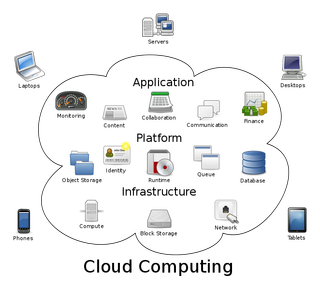What Is the Cloud?
Almost everybody engages in "cloud computing," but a recent survey revealed that most people haven't the faintest idea what it is.
Some 29 percent of Americans think "the cloud" — the thing you access when you cloud-compute — is an actual cloud, the sky or something else related to the weather, according to a nationally representative survey of 1,006 American adults conducted by Wakefield Research.
Other survey respondents defined the cloud as: toilet paper, pillow, smoke, outerspace, cyberspace, mysterious network, unreliable, security, sadness, relaxed, overused, oh goody a hacker's dream, storage, movies, money, memory, back-up, joy, innovation, drugs, heaven and a place to meet. Only 16 percent got the definition about right.

Anytime a person uses a computer, smartphone or tablet to access information or services stored or hosted elsewhere, they are engaging in cloud computing. For example, online banking, online shopping, social networking, and remote storage of photos, music or videos are all cloud-based services. While cloud computing refers to engaging in these online activities, the cloud is sort of an umbrella term for the places where all that remote data is stored, as well as the data itself. [Is it Possible to Retrieve Data When My Computer Fails?]
According to a briefing from the United Kingdom Office for Library and Information Networking (UKOLN), cloud data, services and infrastructure possess the following characteristics: They are remotely hosted, accessible from anywhere, and they are commodified, meaning you pay for what you use just like with gas and electricity.
Still a bit foggy on the cloud? You may be overthinking it. As the UKOLN puts it, the cloud is really just a metaphor for the Internet.
Follow Natalie Wolchover on Twitter @nattyover or Life's Little Mysteries @llmysteries. We're also on Facebook & Google+.
Sign up for the Live Science daily newsletter now
Get the world’s most fascinating discoveries delivered straight to your inbox.
Natalie Wolchover was a staff writer for Live Science from 2010 to 2012 and is currently a senior physics writer and editor for Quanta Magazine. She holds a bachelor's degree in physics from Tufts University and has studied physics at the University of California, Berkeley. Along with the staff of Quanta, Wolchover won the 2022 Pulitzer Prize for explanatory writing for her work on the building of the James Webb Space Telescope. Her work has also appeared in the The Best American Science and Nature Writing and The Best Writing on Mathematics, Nature, The New Yorker and Popular Science. She was the 2016 winner of the Evert Clark/Seth Payne Award, an annual prize for young science journalists, as well as the winner of the 2017 Science Communication Award for the American Institute of Physics.

